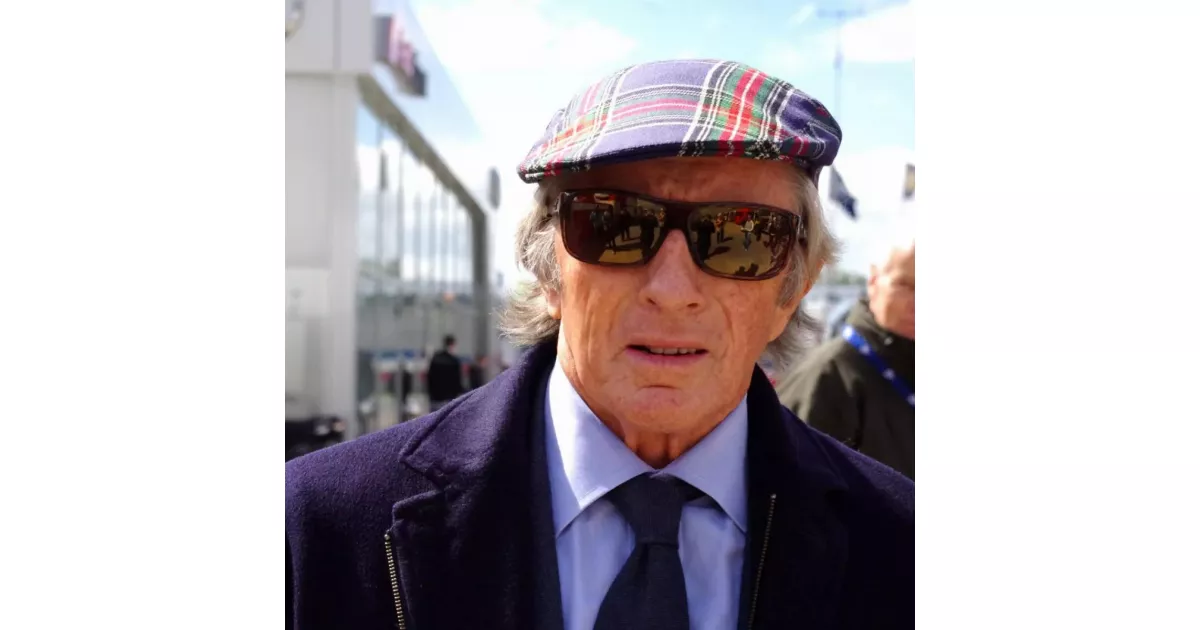Sir Jackie Stewart, nicknamed "the Flying Scot", is a retired British Formula One racing driver. He competed from 1965 to 1973, securing three World Drivers' Championship titles with Tyrrell. Upon retirement, Stewart held records for the most wins (27) and podium finishes (43). Beyond racing, he has worked as a broadcaster and motorsport executive.
June 1939: Jackie Stewart Born
In June 1939, John Young "Jackie" Stewart was born in Scotland.
1953: Brother Competed in British Grand Prix
In 1953, Jackie Stewart's brother, Jimmy, competed in the British Grand Prix at Silverstone.
1960: Olympic Team Competition
In 1960, Jackie Stewart competed for a place in the British trap shooting team for the Summer Olympics, finishing third.
1961: Competed in Filer's Marcos
In 1961, Jackie Stewart scored four wins in Filer's Marcos.
1962: Jaguar E-type Test
In 1962, Jackie Stewart tested a Jaguar E-type at Oulton Park, matching Roy Salvadori's times. He won two races in the E-type.
1963: Multiple Wins in 1963
In 1963, Jackie Stewart earned fourteen wins, a second, and two-thirds, with six retirements.
December 1964: First Race in an F1 Car
In December 1964, Jackie Stewart's first race in an F1 car was for Lotus at the non-championship Rand Grand Prix where he qualified in pole position, but had to retire in the first heat due to a broken Lotus.
1964: Partnership with Ford Motor Company
In 1964, Jackie Stewart began a 25-year partnership with the Ford Motor Company, which had a significant impact on his career and the automotive industry.
1964: Formula Three debut for Tyrrell
In 1964, Jackie Stewart debuted in Formula Three (F3) for Tyrrell, winning dominantly at Snetterton. He later declined a F1 ride with Cooper to gain experience under Tyrrell, becoming F3 champion. He also impressed Colin Chapman and Jim Clark, leading to a spot in the Lotus Formula Two (F2) team.
1964: Signed with Ecurie Ecosse
In 1964, Jackie Stewart signed with Ecurie Ecosse again, and was offered a spot on Ken Tyrrell's Formula Junior team after a successful tryout.
1965: Began competing in Formula One
In 1965, Jackie Stewart began his Formula One career.
1965: Signed with BRM and Debut Season
In 1965, Jackie Stewart signed with BRM, and had his World Championship F1 debut in South Africa, finishing sixth. He secured his first major victory at the BRDC International Trophy and won his first World Championship race at Monza. He finished his rookie season in third place in the World Drivers' Championship.
April 1966: 24 Hours of Le Mans test day
On April 3, 1966 Jackie Stewart appeared at the 24 Hours of Le Mans test day driving a Ford GT40 Mk II version of Holman & Moody and the Ford GT40 owned by Alan Mann Racing.
1966: Crash at Spa-Francorchamps
In 1966, Jackie Stewart crashed at Spa-Francorchamps while driving at 165 mph (266 km/h) in heavy rain, hitting a telephone pole and a shed. He was trapped in the car, rescued by fellow drivers Graham Hill and Bob Bondurant, and lacked proper medical attention at the track. This incident spurred his advocacy for racing safety.
1966: Indianapolis 500 Attempt
In 1966, Jackie Stewart narrowly missed a win at his first attempt at the Indianapolis 500.
1966: Won the Monaco Grand Prix
In 1966, Jackie Stewart won the Monaco Grand Prix in a 2-litre engined car and had an accident at the Belgian Grand Prix, sparking his campaign to improve safety in F1.
1967: Struggles with BRM Reliability
In 1967, despite contesting the Tasman Series with Jim Clark, Jackie Stewart and BRM struggled with reliability problems in F1, with Stewart's highest finish being second at Spa. However, he won F2 events at Karlskoga, Enna, Oulton Park, and Albi. He also placed 2nd in the BOAC 6 Hours at Brands Hatch.
1968: Switched to Tyrrell's Matra International team
In 1968, Jackie Stewart switched to Tyrrell's Matra International team driving a Matra MS10-Cosworth. He also took a prominent role in the team's management.
1969: World Champion
In 1969, Jackie Stewart driving the Matra MS80-Cosworth, dominated many races and became world champion.
1969: Boycott of Spa-Francorchamps
In 1969, Jackie Stewart organized a driver boycott of the race at Spa-Francorchamps due to safety concerns, demanding improvements to barriers, run-off areas, fire crews, and medical facilities.
1970: Can-Am series competition
In 1970, Jackie Stewart competed in the Can-Am series.
1970: Wins at the Daily Mail Race of Champions and Jarama
In 1970, Jackie Stewart took the March 701-Cosworth to wins at the Daily Mail Race of Champions and Jarama. The new Tyrrell 001-Cosworth, appeared in August and suffered problems but showed promise.
1970: Boycott of Nürburgring
In 1970, Jackie Stewart, along with his close friend Jochen Rindt, boycotted the race at the Nürburgring, demanding improvements to track safety measures such as barriers, run-off areas, fire crews, and medical facilities.
1971: Can-Am series competition
In 1971, Jackie Stewart competed in the Can-Am series.
1971: Mononucleosis Diagnosis
In 1971, Jackie Stewart was diagnosed with mononucleosis. Despite this, he continued to race, winning the Formula 1 World Championship.
1971: F1 World Championship win and Can-Am season
In 1971, Jackie Stewart won the F1 World Championship using the Tyrrell 003-Cosworth, with victories in Spain, Monaco, France, Britain, Germany, and Canada. He also participated in a full Can-Am season, driving a Carl Haas sponsored Lola T260-Chevrolet, winning two races and finishing 3rd in the championship. Stewart battled mononucleosis and frequently crossed the Atlantic Ocean for media commitments while winning the championship.
1971: Color Commentator Career Begins
Starting in 1971, Jackie Stewart began his career as a color commentator, covering F1, NASCAR, and Indy car races, including the Indianapolis 500. He also hosted the latter and was known for his insightful analysis and rapid delivery.
1972: Boycott of Zandvoort
In 1972, Jackie Stewart led a driver boycott of the race at Zandvoort until improvements were made to barriers, run-off areas, fire crews, and medical facilities, enhancing track safety.
1972: Second Place in F1 Standings and European Touring Car Championship
In 1972, Jackie Stewart missed the Belgian Grand Prix due to gastritis but secured victories in the Argentine, French, U.S., and Canadian Grands Prix, finishing second in the drivers' standings behind Emerson Fittipaldi. Stewart also participated in the European Touring Car Championship with F1 teammate François Cevert in a Ford Capri RS2600, achieving their best result with a second-place finish at the 6 Hours of Paul Ricard. Additionally, Stewart received the OBE (Order of the British Empire) in 1972.
1973: Sports Illustrated Sportsman of the Year Award
In 1973, Jackie Stewart received Sports Illustrated magazine's "Sportsman of the Year" award, becoming the only auto racer to win the title. He also won BBC Television's "Sports Personality of the Year" award in the same year.
1973: Retirement from Formula One
In 1973, Jackie Stewart retired from Formula One racing, holding records for most wins (27) and podium finishes (43) at the time.
1973: Victories and Retirement Decision
In 1973, Jackie Stewart won races in South Africa, Belgium, Monaco, and the Netherlands, achieving his record-setting 27th victory at the Nürburgring. Following the fatal crash of his teammate François Cevert in practice for the United States Grand Prix, Stewart retired one race earlier than planned. He had already secured the Drivers' Championship at the Italian Grand Prix.
1976: Olympic Games Announcer
In 1976, Jackie Stewart served as a play-by-play announcer for the Luge at the Winter Olympics and the Equestrian at the Summer Olympics, partnering with Chris Schenkel on ABC's Wide World of Sports.
1977: Commentary on Driver Safety
During the 1977 Daytona 500, after Bobby Wawak was burned in a car fire, Jackie Stewart criticized driver negligence regarding fireproof clothing, advocating for flame-resistant and thermal underwear. He highlighted the importance of proper protection for drivers.
1979: Co-Commentator on BBC
In 1979, Jackie Stewart appeared as a co-commentator alongside Murray Walker on the BBC's F1 coverage, including the British Grands Prix, providing his expertise and insights to the broadcast.
1980: Diagnosed with Dyslexia
In 1980, Jackie Stewart was diagnosed with dyslexia at the age of 41, after his oldest son Mark was diagnosed with the condition.
1986: Australian and Canadian TV Coverage
From late 1986 to the mid-1990s, Jackie Stewart worked on Australian and Canadian TV coverage, contributing his expertise to motorsport broadcasts.
1986: Departure from ABC Sports
In 1986, Jackie Stewart left ABC Sports due to tension with producer Roone Arledge over Stewart's commercials for Ford Motor Company airing on Wide World of Sports. Stewart mentioned the network's shift after merging with ESPN and Capital Cities, leading to reduced budgets.
1986: End of ABC Sports Commentary
In 1986, Jackie Stewart's time as a commentator for ABC's Wide World of Sports came to an end, after tensions between him and ABC Sports producer Roone Arledge. He was doing commercials for Ford Motor Company, which aired on Wide World of Sports, causing conflict. He revealed in his book that Wide World of Sports began to lose its soul when ABC first merged with ESPN and then with Capital Cities.
1987: Alain Prost Breaks Wins Record
In 1987, Alain Prost won the Portuguese Grand Prix, breaking Jackie Stewart's record for the most wins by a F1 driver, which Stewart had held for 14 years. Stewart expressed happiness that Prost, whom he considered the best driver in F1, broke his record.
1987: Commentary with NBC SportsWorld
In 1987, Jackie Stewart began covering CART-sanctioned Indy car races on NBC SportsWorld, starting at Long Beach, alongside Paul Page. He focused on road course and street races.
1988: Commentary on Record Being Broken
During his commentary work for Channel 9 during qualifying for the 1988 Australian Grand Prix, Jackie Stewart addressed the numerous questions about his feelings on Alain Prost breaking his record, stating he was happy it was Prost, whom he considered the best driver in F1, who broke it.
1988: Return to NBC SportsWorld
In 1988, Jackie Stewart returned to NBC SportsWorld to cover CART-sanctioned Indy car races, working alongside Charlie Jones. He continued to cover road course and street races.
1989: Departure from NBC SportsWorld
In 1989, Jackie Stewart left NBC SportsWorld and was replaced by Johnny Rutherford and Tom Sneva.
1990: Induction into International Motorsports Hall of Fame
In 1990, Jackie Stewart was inducted into the International Motorsports Hall of Fame, recognizing his significant contributions and achievements in the sport.
1992: Nigel Mansell Breaks British Wins Record
In 1992, Nigel Mansell won the British Grand Prix, breaking Jackie Stewart's record for the most wins by a British F1 driver, which Stewart had held for 19 years.
1993: Co-Commentator on BBC
In 1993, Jackie Stewart once again appeared with Murray Walker as a co-commentator on the BBC's F1 coverage, which included the British Grands Prix, enhancing the broadcast with his experience and analysis.
1996: Honorary Doctorate from Heriot-Watt University
In 1996, Jackie Stewart was awarded an honorary doctorate by Heriot-Watt University in Edinburgh, acknowledging his accomplishments and influence beyond motorsports.
1997: Formation of Stewart Grand Prix
In 1997, Jackie Stewart returned to Formula One as a team owner, forming Stewart Grand Prix in partnership with his son, Paul. The team, a development of Paul Stewart Racing, debuted at the 1997 Australian Grand Prix and achieved its first success at the Monaco Grand Prix.
1997: Team principal of Stewart Grand Prix F1 racing team
In 1997, Jackie Stewart, in partnership with his son Paul, became team principal of the Stewart Grand Prix F1 racing team.
July 1998: Ford Acquires Cosworth
In July 1998, Ford acquired Cosworth, leading Stewart Grand Prix to design and build a new engine for the 1999 season, marking a significant shift in the team's technical direction.
1998: Honorary Doctorate from Cranfield University
In 1998, Jackie Stewart received an honorary doctorate from Cranfield University, where he later served as chairman of the steering committee for the MSc Motorsport Engineering and Management program.
1998: Stewart Grand Prix's Second Season
In 1998, Stewart Grand Prix's second season proved less competitive, with the team failing to achieve any podium finishes and scoring few points throughout the year.
1999: Team principal of Stewart Grand Prix F1 racing team
In 1999, Jackie Stewart was team principal of the Stewart Grand Prix F1 racing team, in partnership with his son, Paul.
1999: Stewart Grand Prix Victory
In 1999, Stewart Grand Prix experienced consistent competitiveness, culminating in a victory at the European Grand Prix at the Nürburgring with Johnny Herbert. Rubens Barrichello achieved notable success with three third-place finishes.
2000: Acquisition by Ford
In 2000, Stewart Grand Prix was acquired by Ford and rebranded as Jaguar Racing, marking a transition in team ownership and identity.
2005: Jaguar Racing Becomes Red Bull Racing
In 2005, Jaguar Racing, formerly Stewart Grand Prix, was sold and became Red Bull Racing, continuing its presence in Formula One under new ownership and branding.
2005: Jackie Stewart's Record
Until 2005, Jackie Stewart was the only driver to have won the championship in a car built by a French constructor, and remains the only driver to win the world championship in a car built in France as well as in a car entered by a privateer team.
2008: Royal Bank of Scotland Loses £24bn
In 2008, the Royal Bank of Scotland experienced substantial financial losses, amounting to £24 billion, prompting Jackie Stewart to waive his consultancy fee in response the following year.
March 2009: Waiving Royal Bank of Scotland Fee
In March 2009, Jackie Stewart, serving as head sports consultant for the Royal Bank of Scotland, waived his fee for the year in response to the bank's significant financial losses in 2008, demonstrating his commitment to the organization.
2015: Lewis Hamilton Surpasses Championship Record
In 2015, Lewis Hamilton became the first British driver to win three World Championships, surpassing Jackie Stewart's previous record. Stewart was the only British driver to have achieved this until Hamilton's accomplishment.
2015: Equalled by Lewis Hamilton
In 2015, Lewis Hamilton equalled Jackie Stewart's record of being the only British driver with three championships.
March 2017: Last Surviving F1 Champion from the 1960s
In March 2017, following the death of John Surtees, Jackie Stewart became the last surviving F1 World Champion from the 1960s.
2017: Last surviving Formula One World Champion from the 1960s
After John Surtees' death in 2017, Jackie Stewart became the last surviving Formula One World Champion from the 1960s.
2022: Oldest Living F1 Winner
In 2022, upon the death of Tony Brooks, Jackie Stewart became the oldest living F1 winner. Brooks raced during the 1950s.
2023: Commentary Career and Concorde Flights
In 2023, Jackie Stewart revealed that while working for ABC's Wide World of Sports, he would frequently fly on the Concorde for race telecasts. He worked with Jim McKay and covered events like stock car races in Atlanta, Georgia, utilizing helicopters to quickly return for night flights.
2023: Beyond the Grid Podcast Revelation
In 2023, on the Beyond the Grid podcast, Jackie Stewart revealed his decision to retire was influenced by the demanding pace of his life, the loss of friends, and health issues, including mononucleosis in 1971 and a burst gastritis. He cited the heavy travel schedule and the dangers of racing as primary reasons for his retirement.
Mentioned in this timeline
The United States of America is a federal republic located...
Sports Illustrated SI is an American sports magazine launched in...
The National Broadcasting Company NBC is a major American commercial...
Germany officially the Federal Republic of Germany is a nation...

Lewis Hamilton is a British Formula One racing driver currently...
Africa is the second-largest and second-most populous continent comprising of...
Trending
24 minutes ago Lesotho: Frontliners help family overcome poverty; South Africa sees tourism boom in 2026.

24 minutes ago Sara Eisen on The View: Tense Moments and Financial Expertise Displayed.

1 hour ago Ryan Hurst's Kratos Revealed in Prime Video's 'God of War' Series: Cast Updates

1 hour ago Cowboys to Franchise Tag George Pickens for $28 Million: A Bold Move

1 hour ago Rublev dominates Rinderknech, secures Dubai 2026 SFs spot; stats rival Djokovic, Federer.
25 minutes ago Samsung Galaxy S26 Series Unveiled: Intuitive AI Phone with Snapdragon 8 Elite Gen 5.
Popular

Jesse Jackson is an American civil rights activist politician and...

Barack Obama the th U S President - was the...

Susan Rice is an American diplomat and public official prominent...

XXXTentacion born Jahseh Dwayne Ricardo Onfroy was a controversial yet...

Michael Joseph Jackson the King of Pop was a highly...

Kashyap Pramod Patel is an American lawyer who became the...
